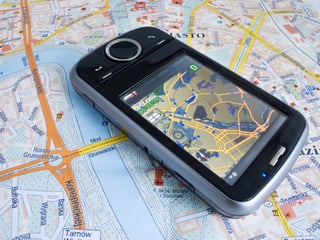 A global positioning system (GPS) device is an amazing tool. We use them in our vehicles for stress-free navigation. On the links, it helps duffers and scratch golfers alike take a few strokes off their game by accurately determining distances to the pin. But did you know that GPS clocks are also an excellent way to make sure accurate time is kept in a school or a place of business?
A global positioning system (GPS) device is an amazing tool. We use them in our vehicles for stress-free navigation. On the links, it helps duffers and scratch golfers alike take a few strokes off their game by accurately determining distances to the pin. But did you know that GPS clocks are also an excellent way to make sure accurate time is kept in a school or a place of business?
The GPS Clock — What Makes it Tick
First off: a little background information on GPS and how it works. GPS stands for "global positioning system." It's a network of orbiting satellites that provide navigation and communication information to earth. One feature embedded in the GPS signal is time, which is synchronized with the atomic clock at the National Institute of Standards and Technology in Boulder, Colorado. The atomic clock serves as the United States' primary time and frequency standard, and synchronization via satellite makes GPS clocks extremely accurate and reliable.
You may be wondering, does the clock need to be outdoors to receive a signal? No — not at all. These clocks do not receive a signal directly from the GPS. A controller receives the time signals from the GPS, and then the controller distributes the correct time to clocks by way of a direct connection or wireless transmission. While clocks do not need to be outdoors, it is important that clocks receiving the incoming signal be within range of the transmitter.
Benefits of GPS Synchronized Clocks
The pinpoint accuracy of clocks working from a GPS provides many benefits, but the most important benefit is keeping reliable time. At a school, students can gauge their test-taking pace while in the classroom, then they can move to and from classes efficiently when the bell sounds.
In the workplace, a GPS-signaled clock system keeps employees on-time during shift changes and enhances productivity. Breaks are also streamlined when everyone knows the precise time. Thanks to a feature called non-volatile memory, GPS clocks continue to work during power outages, adjusting to re-acquire the precise GPS time once power is restored. They also automatically adjust for Daylight Saving Time.
Types of GPS Synchronized Clocks
There are several different styles of clocks that get their time from GPS-signaled controllers: analog and digital, powered by batteries or by 110 volt AC power. Sizes and display styles also vary, as the typical clock ranges from 10 – 24 inches in diameter. Square clocks are also available.
To get more information on the technology behind the GPS time systems or to talk to an expert on GPS clocks, start here: GPS clock solutions.

